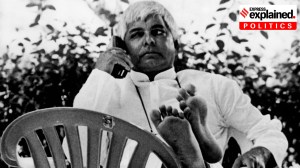Iran vote: India prompted by safeguards pact with IAEA
The governments decision at the IAEA to vote in favour of a resolution referring the Iran nuclear programme again to the UN Security...
The governments decision at the IAEA to vote in favour of a resolution referring the Iran nuclear programme again to the UN Security Council was prompted by the fact that any other decision would have brought into question Indias own safeguards agreement with IAEA.
Having just formalised the safeguards agreement by notifying its facilities through a separation plan to the IAEA,India did not want to give out a message that would be seen undermining the nuclear watchdogs safeguards mechanism which is what was the charge against Iran. Tehrans delay in informing IAEA about the Qom facility the information was given in September 2009 while plans were afoot since 2006-07 was the key provocation for this resolution.
Prime Minister Manmohan Singh is learnt to have taken the decision on the vote at Port of Spain when the text of the resolution was finally available. He is believed to have consulted Finance Minister Pranab Mukherjee over the phone amid differing views within the government on whether one could avoid taking a position by abstaining from the vote.
Its reliably understood that the PM was clear about casting the vote because he was concerned over the implications even an abstention could have on Indias safeguards agreement. That too at a time India was looking to conclude a reprocessing agreement with the US and a civil nuclear cooperation agreement with Canada.
Countries which had reservations over the nuclear deal and even doubted Indias intentions while the US went the extra mile to get India the necessary exceptions would have questioned New Delhis political commitment to its own safeguards agreement,which was one of the key steps India had taken from its side as part of the deal.
The other factor which weighed on India was that this was a German sponsored resolution. Germany as chair of the Nuclear Suppliers Group,it may be recalled,had played a very positive role throughout the heated deliberations over granting an exemption for India. In fact,German Chancellor Angela Merkel had personally played a vital role during those critical days for India,weathering stiff domestic opposition to the nuclear deal and that too barely a year before the German polls.
Sources confirmed that this question of principle,particularly when heads of governments had already approached India to support the resolution,was an important contributing factor to the governments decision. Thirdly,Russia and China too were backing the decision that would have made India stand out in the abstention list.
At the same time,it was agreed within the government to balance the decision by making it clear in the explanation of vote that New Delhi did not interpret the vote as one which would lead to sanctions or any other punitive action. During his talks with US President Barack Obama,the PM repeatedly conveyed the positive message he was getting from Iran placing hope on the engagement strategy being pursued by the Obama Administration.
In fact,Iran was being billed as the potential first diplomatic success for Obama but the reference again to UNSC can push Iran back to taking the hard line. Obamas critics are already seeing the move as a frustrated decision to fall back on the Bush line after unsuccessful diplomatic forays with a new deal to Iran. At the same time,policy-makers in Washington and supporters in Europe feel the resolution could force Tehran to reconsider the deal offered by Obama and backed by European powers like France and Russia.
US interlocutors along with France and Russia had offered a deal to Iran in October under which 70 per cent of low enriched uranium from Iran could be reprocessed in France and Russia to a form usable in the Tehran research reactor,which would have helped allay concerns that Iran was just a year away from making the nuclear bomb. Tehran,however,rejected the offer leading to a tough response from IAEA.



- 01
- 02
- 03
- 04
- 05




























